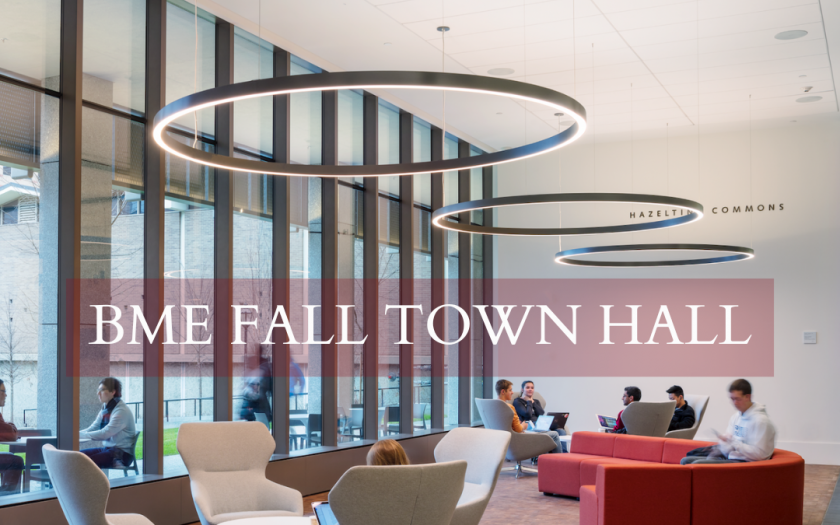BME Fall Town Hall Brings Community Together to Discuss Diversity, Inclusion, Wellness, and More

In November, Brown’s BME Graduate Program hosted its Fall Town Hall, which brought together the community for workshops, discussions, and a social hour.
BWell Health Promotion, a holistic health wing of Brown’s Health and Wellness services, hosted the first workshop at the town hall, which focused on boundary setting. BWell’s Associate Director for Empowerment and Prevention Services, Naomi Ninneman, and Health Promotion Specialist, Takyah Smith, led the workshop, guiding students through key boundary-setting steps.
Boundary setting is “easier said than done,” acknowledged Naomi. Students discussed mental, physical, sexual, digital, emotional, material, financial, and time-related boundaries and what inhibits them from setting boundaries in each context.
Dominique Barnes, a Ph.D. student in Fleming Lab, said that boundary setting is usually something she only thinks about “when it becomes an issue.” She said she appreciated thinking through boundaries in a “calmer situation,” which gave her the time to self-reflect and see that the challenges she experiences with boundaries are similar to those others face.
It can be “easier to set a boundary with someone who is a stranger than someone who you are close to” since you may be “more invested in the outcome of the conversation,” said Naomi. She added that “outside forces” like deadlines can complicate a student’s ability to set appropriate boundaries.
Naomi and Takyah emphasized that assertiveness is key in setting boundaries and offered workshop participants clear strategies to help ease conversations around boundaries. Using “I” statements can help focus the conversation on your feelings, rather than on placing blame on someone else’s actions, they said. Setting expectations at the beginning of a new relationship can also prevent confusion later on.
Naomi encouraged students to practice “being assertive, firm, but kind” and remember that “‘no’ is a complete sentence.”
Alec McCall, a Ph.D. student in the Shukla Lab, noted that BWell included examples of on-campus resources to help students practice self-care and boundary setting, saying that he plans on “taking advantage” of campus massage services. He said the workshop was “a cool way to reflect and see how we should be conducting research in a healthy way.”
The second workshop focused on diversity, equity, and inclusion and was led by Alycia Mosley Austin, Associate Dean of Diversity and Inclusion for the graduate school. Alycia started the presentation by grounding participants in a common understanding of what DEI means. She then asked participants to think about what challenges have prevented STEM fields from successfully increasing diversity.
One student participant said that STEM’s focus on objectivity can be a barrier because “objectivity is written from a certain demographic or majority narrative.”
Alycia then presented four different models of how minority groups can be treated in a team setting. The models of epistemic exclusion, assimilation, and dominance all had major faults — entirely neglecting, dramatically altering, or diminishing the perspectives of individuals in the minority group. Epistemic inclusion is the model teams should work toward, she said, where minority and majority group members have their perspectives and behaviors altered as a result of interaction.
Alycia encouraged lab teams in the audience to think about ways they could work toward epistemic inclusion. She said all labs can start by creating a statement of values, where they outline what is important to facilitating a healthy lab community.
Conversations around DEI are “ always hard to have, but it’s good that the department is having those open conversations,” said Alexxa Cruz-Bonilla, a Ph.D. student in the Wong Lab.
Audrey McCarthy, a Ph.D. student in the Desai Lab said she appreciated how the presentation included a lot of synthesized data. Kevin loGiudice, a Ph.D. student in the Srivastava Lab, said he appreciated that the workshop presented “new information and new perspectives” compared to DEI workshops he has attended in the past.
At the end of the workshop, Alycia presented a case study with an example of an offensive incident that could occur among members of a research team. Students then discussed how they would handle the incident if it occurred in their labs. The questions posed by Alycia about the case study made Kevin think from “different perspectives,” he said.
“It was really nice to see other people’s responses because their responses also made me think about my own response to the case study,” Audrey said.
After both workshops were completed, the Biomedical Engineering Board (BMEB) led a Q&A discussion with Co-Director of Graduate Studies Dr. Vikas Srivastava and Director of the Master’s Program Dr. Marissa Gray. Students asked questions about funding, curriculum, and more and were able to hear directly from their program leaders.
“It answered some of the burning questions that we had,” said Alec, who helped facilitate the discussion.
The town hall ended with a social hour filled with conversation and catered food. Dominique said she was happy to see her advisor, who works at the medical school, at the event. “It makes me feel like he wants to be here and he wants to make sure that my experience is the best it can be,” she said. “It feels good, as a student, to see that kind of interaction.”
 Menu
Menu